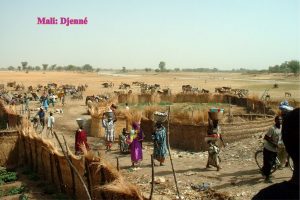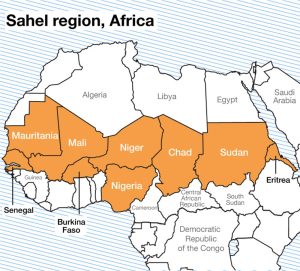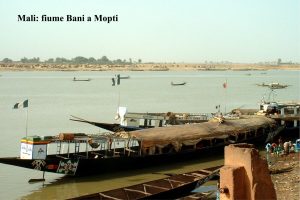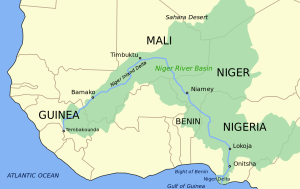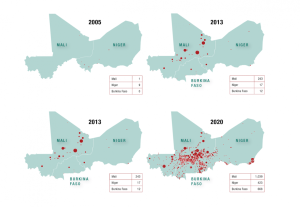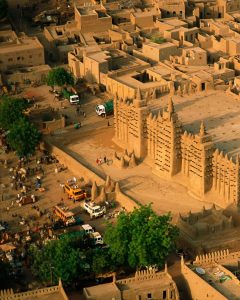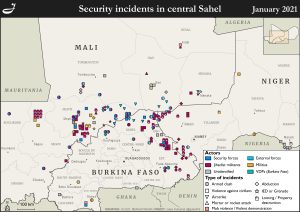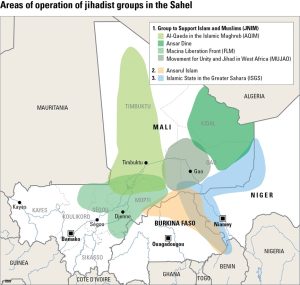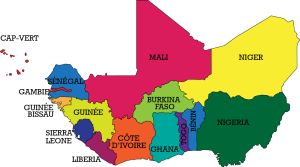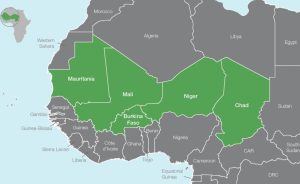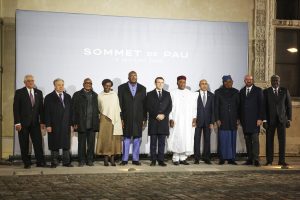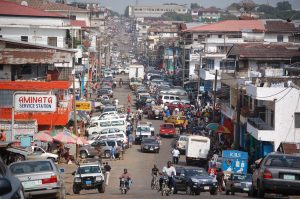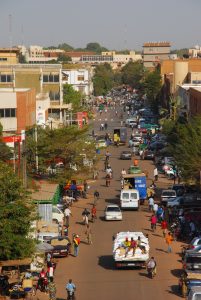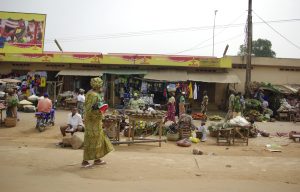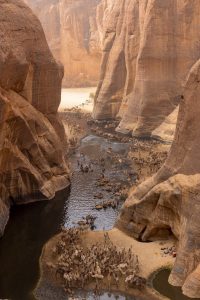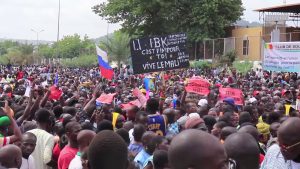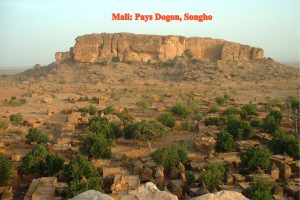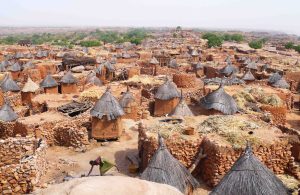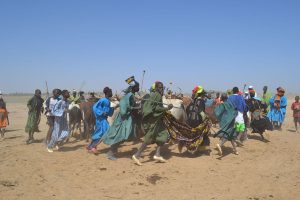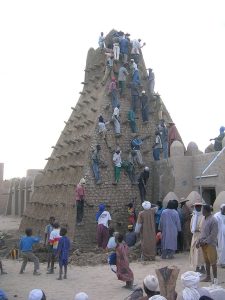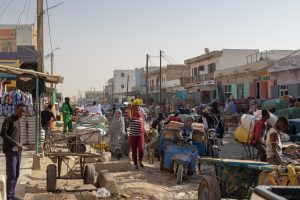by Glauco D’Agostino
A few weeks after President Emmanuel Macron called for a “new alliance with Africa” in his opening speech of the French Presidency to the Council of the European Union, Islamic World Analyzes proposes the analysis by Glauco D’Agostino on the Sahel, first published in April last year in Geopolitica. Revistă de Geografie Politică, Geopolitică şi Geostrategie, Anul XIX, nr. 87-88 (2/2021) GEOPOLITICĂ ŞI (IN)SECURITATE (II) CRIZA DE IDENTITATE. Since, there have been many events that changed the geopolitical and institutional frameworks of the concerned countries, from the coups in Mali, Guinea and Burkina Faso to the killing of Tchad long-term President Idriss Déby Itno to President Macron’s statement on Operation Barkhane’s end in 2022 early months. Precisely the reminiscence of the situation in the Sahel less than a year ago helps to confront France and the European Union with responsibilities towards Africa. According to President Macron, Europe has “the duty to offer the African continent a new alliance” and “the destinies of the two shores of the Mediterranean are linked”. “In the coming months, we need to take a new step forward, reinventing a new alliance with the continent. Firstly, we need an economic and financial New Deal with Africa, based on what we built in May last year,” he said. The intentions of the ineffable President seem to have changed from the war attitude shown in previous years. We believe him, as long as his statements would not be just a political screen useful to confirm him as president next April, and the day after the potential new sworn at the Elysée, he would not come back to the short-sighted politics of Sahelian occupation shared with the European Union in the name of the evergreen counter-terrorism fight.
Abstract
The ruling counter-terrorist strategy in West Africa and Sahel focuses on military force, but it aggravates regional insecurity and proves the limits of its short-term vision. All recent elections in the area have allowed hopeful assessments about democratic consolidation, even though the socio-economic framework threatens political-institutional stability yet. The goal of eradicating and eventually eliminate poverty has little to do with the limitation of national sovereignty. Local people, mostly those far from power-sharing benefits, deem the riots (unfortunately, also those exploiting terrorism) as a redemption opportunity for the related social, political, religious or ethnic group. Repression, correctly accepted as a weapon against terrorism, still affects harmless people, who become the actual victims. In some areas, jihādist groups keep control of the territorial and juridical-administrative system by establishing both the Sharī’a Law and traditional-inspired local management.
France, the former colonial power over most of the area, leads joint counter-terrorism operations with the G5 Sahel countries, but the “Parisian”-brand approach seems to act through heavy military operations not followed by effective development programs. The weakening and lack of E.U. commitment to West Africa do not favour a clarification in this regard, and Paris has lost credibility with the French-speaking countries of Africa and their local communities. In Mali, anti-French protests erupted before the 2020 August coup and following the 2013 French operation against the nationalists and Islamists who had declared Azawād independence. The effects of that improvident operation are still affecting also Burkina Faso and Niger.
Morocco and Algeria, often attacked by terrorist forces, exploit methods that could mitigate the violence consequences and, over time, be a different option than the military actions. Other countries in the area are not able to affirm the actual independence their post-colonial Constitutions guarantee. Attempts at regional cooperation based on the integration of economies may offer one way to escape these external influences, at least on an economic level. The returns should concern central and local institutional strengthening, government control of the areas, public administration reform, an end to rampant corruption, rural community services, health and education rights.
Keywords: Sahel, West Africa, jihādism, counter-terrorism, France, G5 Sahel, Mali, stabilisation, destabilisation, national sovereignty, democratic processes, regional cooperation, development programs.
***
Causes of conflict and law enforcement strategies
According to the Global Terrorism Index 2020, Burkina Faso “had the largest increase in terrorism, where deaths increased by 590 per cent to 593.” But Nigeria and Mali, among the first places in the ranking, precede it in terms of “terrorist attacks over the prior five years.”[1] And reports of the International Chamber of Commerce’s International Maritime Bureau (IMB) record in the Gulf of Guinea 95% of crewmembers kidnapped in 2020 over global figures,[2] and piracy and armed robbery increase.[3] The data point to actual security negative trends in many areas of West Africa and Sahel currently hit by worrying violence. But the international organisations’ official press seem to show satisfaction for the significant progress in the fight against jihādism.
Thus, underscore of jihādism (which at this point we no longer know what would stand for) and underestimation of non-state armed groups vying for territory on disparate reasons, from resource control and border management to separatism and ethnic prevalence.[4] Of course, almost always, extra-regional state interests are glimpsed in the background. They aim at exploiting the energy and mineral wealth the area is rich in (Gulf of Guinea and Mauritania oil, Niger uranium and gold, and so on) and act as catalysts for the establishment and rising of local armed militias involved in the contrast among their respective sponsors. And yet, even the never-softened ethnic issues awaken today because instigated by manipulations of anti-terrorism fight leaning to not discern the causes, instead, to rank people in good and nasty ones. This attitude sows hatred and conflicts on ethnic and religious bases, often accordingly giving rise to heterogeneous alliances such as the one between the Fulani from Mali and the Movement for Oneness and Jihād in West Africa.[5] Nothing new than ethnic riots happened in the past in Senegalese Casamance or Mauritania, albeit in a different historical and political context.
The ruling counter-terrorist strategy by regional state establishments and the international partners protecting them appears to focus on military force. The model is U.S.-style (but in this case, Washington is not the main actor), and the Americans implemented it in Vietnam, Iraq, Afghanistan, Somalia, Yemen and so on. One thinks, as a result, the greater the impact force on the field, the less the danger of destabilisation. Simply, let’s identify an enemy to hit. We would say this strategy applied throughout West Africa displays the goal of guarding the sixty-years-old political and institutional arrangements of de-colonisation and maintained by dint of coups and pseudo-democracies, so much for meeting the acceptance from the “politically correct” thinking. Yet, also the socio-economic framework in those countries threatens political-institutional stability. But this logical correlation seems to have little effect either on public opinion or on those who profit from permanent destabilisation and wait to intervene by force to stabilise temporarily.
As the records of the cited model proved, the result is that the military pressure and unscrupulous institutional staff push local people, mostly those far from power-sharing benefits, to deem the riots (unfortunately, also those exploiting terrorism) as a redemption opportunity for the related social, political, religious or ethnic group. The consequence is the deconstruction of the presumed national identity and integrity, that destabilisation assigned to antagonists rather than to the methods to fight them. And the assumption is each time the same. Whenever people show acquiescence to the insurgent groups, the public opinion must understand it is a subculture problem. After all, they may tolerate some collateral damage either from terrorists or “liberation forces”.
Edoardo Baldaro, from the Université Libre de Bruxelles, says for ISPI: “What we observe in different areas of the Sahel today is the formation of hybrid political orders which more and more resemble jihadi «proto-states».”[6] It currently occurs in the Liptako-Gourma three-border region straddling Burkina Faso, Niger and Mali and in the Mopti and Ségou regions of central Mali,[7] where jihādist groups keep control of the territorial and juridical-administrative system by establishing both the Sharī’a Law and traditional-inspired local management.
Of course, prior considerations do not mean to delegitimise international operations but highlight the latter short-sightedness. If they handle every insurrection facing it militarily just as a public order issue (like saying, massacre versus slaughter), miss to investigate the failure of the post-colonial pattern and don’t support reform of its root, evermore will meet people scepticism and even opposition, resulting in the security environment worsening. And repression, correctly accepted as a weapon against terrorism, still affects harmless people, who become the actual victims. You can ignore the inconsistency of states that need defence; neglect the fiction of national borders plotted on the territorial jurisdiction of colonial military cantonments; disregard the permanent crisis of élites that a “Resident-General” recruited on a “reserved” link to exogenous potentates; act without totally reorganise strategies matching the emancipation of the peoples while contrasting terrorism, but all seems senseless and raises doubts about the real intentions of those who in fact manage the resolution of international crises.
International bodies and interventions
Several international bodies and organisations engage in solving the problems of this region, which plays a pivotal role in Europe-Mediterranean-Sub-Saharan relationships: UNOWAS, UNDP, ECOSOC, the Peacebuilding Commission (all by the United Nations), the World Bank, the Sahel Alliance by the European Union, the Peace and Security Council (the African Union executive body), the African Development Bank, the regional political and economic union of ECOWAS and other subregional organisations.
There are countless programs launched for this purpose, from the U.N. Support Plan for the Sahel (UNSP) within the framework of the United Nations Integrated Strategy for the Sahel (UNISS)[8] to the military and economic aid programs inaugurated by various state and supra-national entities (U.S., E.U., France). The UN has recently renewed the peacekeeping mission in Mali (MINUSMA) with fifteen thousand personnel.
Many analysts hope for increasing the partnership with the G5 Sahel, the 2014-born institutional coordination on the French initiative for regional security and development cooperation. The attempt to involve the five Sahelian countries (Mali, Mauritania, Burkina Faso, Niger and Tchad) should seem to reverse the trend (and need) of finding solutions outside the region. But the operation and the “Parisian”-brand approach seem to leverage once again on the fight against terrorism through heavy military operations not followed by effective development programs and, above all, the central and peripheral institutional strengthening of the involved countries. So much so that the anti-government and anti-French demonstrations that broke out in Bamako in January 2020 were precisely a direct protest at the G5 Sahel summit in Pau scheduled a few days later.[9] In practice, it is as if Europe as a whole continues to look today at the Sahel, as a space resulting from French colonial breakup, by its perspective of aloofness to the social local realities mechanisms.[10]
The weakening and lack of E.U. commitment to West Africa do not favour a clarification in this regard. The expiring Cotonou Partnership Agreement (CPA) of 2000, which commits more than 100 countries from the E.U., Africa, Caribbean and Pacific to achieve the main objective of “reducing and eventually eradicating poverty”, extended the time of its scheduled end in February 2020. The deal of December 2020 is just a political understanding, pending new legal disposal before the next 30 November regulating the arising treaties. The lack of accordance with the UN about the Economic Partnership Agreements (EPAs) to create a common free trade area between the EU and CPA countries, the start of the African Continental Free Trade Area (AfCFTA) in January 2021, and the excessive claims to urge Brussels-alike political and civil requirements stressed the bureaucratic difficulties in the negotiation process.[11] One must think about the European chanceries skill to seriously value West Africa and Sahel situation, except for the Élysée, which is well aware of the context and applies on the field a Bonapartism always in vogue in Paris.
France, the former colonial power over most of the area, leads joint counter-terrorism operations with the G5 Sahel countries, contributing over 5,000 men to Operation Barkhane.[12] On June 3rd 2020 in the north-eastern Malian region of Kidal, French special forces assassinated the Algerian Abdelmalek Droukdel, Emir of the Salafist organisation al-Qāʿida in the Land of the Islamic Maghreb (AQIM),[13] then replaced by compatriot Abū Ubaidah Yūsef al-ʿAnnābi. Since 2020, France has also led the Europe-prompted Takuba Task Force, acting in the Liptako-Gourma region and integrating the Operation Barkhane command. Its activity targets the Islamic State in the Greater Sahara (IS-GS) Salafi group, founded in 2015 by Adnan Abū Walīd aṣ-Ṣaḥrāwi. But the list of militant Islamist organisations is too long for Paris to hope to eradicate them by war, starting with the various branches of Jamāʿat Nusrat al-Islām wa-l-Muslimīn by Tuareg Iyad Ag Ghaly.[14]
The alleged democratic consolidation
Meanwhile, the UN and the G5 Sahel are sending out reassuring signals. The Ghanaian Mohamed Ibn Chambas, Special Representative and Head of the U.N. Office for West Africa and the Sahel (UNOWAS), reports to the Security Council “significant progress” on the women, youth, peace and security agendas in West Africa and the Sahel.[15] And six months earlier, Muḥammad Ould Shaykh Muḥammad Aḥmad Ould Ġazwānī, the authoritative President of Mauritania, while expressing his concern, reassured Macron, who arrived in Nouakchott for a G5 Sahel summit, recording “significant progress” in the fight against jihādism.[16]
Of course, the recent elections in Guinea, Côte d’Ivoire, Burkina Faso, Ghana and Niger (all of them for Presidents and Parliaments), and Liberia (for the Senate), have allowed hopeful assessments about democratic consolidation, “despite contestation and violence in Guinea and Côte d’Ivoire”, as Ibn Chambas acknowledged. In the latter neighbouring countries, both incumbent Presidents, Muslim Mandinka from opposite political leaning, have achieved the third consecutive mandate. In Guinea, the presidential candidate of the Liberal opposition had claimed victory in the first round, so challenging the Constitutional Court verdict proclaiming Alpha Condé for the third term. In Côte d’Ivoire, Alassane Dramane Ouattara achieved a controversial victory gaining over 94% of the poll. The progressive-wing opposition, which boycotted the presidential elections, saw its spokesman arrested just a week later under investigation for conspiracy against state authority, insurgency, murder and terrorist acts and then released on parole.
Continuity also prevailed in turbulent Burkina Faso and Niger. In Burkina Faso, whose governments have often had to resort to emergency rule, incumbent President Roch Marc Christian Kaboré won the election in the first round, among complaints of irregularities in the voting, eventually overcome under opposition liability. Kaboré is the head of a social-democratic movement he founded in 2014 in dissent from the methods of Blaise Compaoré, who had been President for 27 years and had inspired Kaboré’s very political stance.[17] In neighbouring Niger, Moḥamed Bazoum, President of Tarayya party (Nigerien Party for Democracy and Socialism) and in political harmony with previous President Maḥamadou Issoufou, won the presidential elections in the second round, defeating Mahamane Ousmane, the first democratically elected President of Niger in 1993. The same year the latter had chosen Issoufou as his Prime Minister before reducing his institutional powers. In short, a game between rivals in the same political family. Following his exit from 10 years presidency, the charismatic Issoufou keeps the Tarayya leadership.
In Ghana, President Nana Addo Dankwa Akufo-Addo, leader of the conservative New Patriotic Party (NPP), has been reconfirmed. Akufo-Addo is currently the ECOWAS President, a charge he inherited in 2020 from the President Issoufou of Niger. In Togo, instead, the news is not electoral, since Eyadéma presidential dynasty has been in the saddle for 54 years, first with Gnassingbé, then with his son Faure Essozimna Gnassingbé. Since September 28th 2020, Togo has had for the first time a woman as its Prime Minister: her name is Victoire Tomegah Dogbé. A good omen for women’s empowerment throughout West Africa, even if only as a symbolic act.
Among the West African countries called to near future polls (Tchad and Benin for presidential elections, the Gambia for a constitutional referendum), the prospective political situation in N’Djamena cause concerns. There the nationalist President Idriss Déby Itno, who in 1990 seized power in a military coup overthrowing Hissène Habré’s regime, will run for a sixth presidential mandate after the 2018 non-retroactive constitutional reform allowing him two more terms.[18] But one could deem the ineffable “Marshal” a champion of human rights since he abolished the death penalty in 2020. And, after all, he is a backbone for the G5 Sahel counter-terrorism operations!
French interference and worsening security
The truth is that, despite the rhetoric of democratic processes, Paris has lost credibility with the French-speaking countries of Africa and especially their local communities, whom it ignores and leaves with no live dialogue (Olojo et al., 2020). Especially since the anti-insurgency war effort proved ineffective in regaining government control of the territories, assuming they had it in the past. By contrast, armed militias of all kinds and foreign armed forces under the aegis of integrated military programs occupy their lands.[19]
The evidence of citizens’ loss of confidence is the anti-government surge in various French-speaking countries to complain of elections running and, more generally, rampant corruption. Furthermore, anti-French protests erupted, especially in Mali before the 2020 August coup and following the 2013 military intervention. Paris had no qualms about supporting the 2012 military coup against President Amadou Toumani Touré, regularly elected since 2002. And in the hereafter, it did not hesitate to defend the resulting Ibraḥim Boubacar Keïta’s “pseudo-democratic” regime settled in Bamako.[20] It is no mystery the situation has worsened since across the Sahel, and the August coup is proof. The recent bloodless Keïta’s ouster, which the so-called international community of course condemned and sanctioned, is sure not an exercise in democracy, but did it serve to reverse the course? Now, Colonel Bah N’Daw leads a provisional government lasting for 18 months, and his Prime Minister, the diplomat Moctar Ouane, is a civilian.
There! The current problem origin is just the 2013 French interference in Mali with Operation Serval (Leopard) against the nationalists and Islamists who had declared Azawād independence. Unfortunately, the effects of that improvident operation are still affecting not only Mali but also Burkina Faso and Niger; and all related governments, favouring the will of Paris, had adopted primarily military approach against entire populations, become targets of brutal state repression or armed ethnic groups (Baldaro, 2021). In Mali, various Islamist movements have taken advantage of that to accredit themselves as defenders of those populations. For instance, ʾAnṣār ad-Dīn did so towards the Tuareg of the Kidal region, and its branch Katibat Macina to the Fulani of the Mopti region, where indeed, acting in the place of the state authorities, the group carries out peacekeeping tasks in the conflicts between Fulani and Dogon from Bandiagara and Sangha.
Every government has its approach for improving security in the area. The policies with which Mali and Burkina Faso, on the one hand, and Niger, on the other, apply the control of territorial security differ in terms of methods for the use of force: decentralised and entrusted to organisations for the self-defence of local communities, in the former case; centralised in the hands of the state monopoly, in the latter (Moderan, 2021).
Today, someone calls for full enforcement of the May-June 2015 Agreement for Peace and Reconciliation in Mali, which, by a tenet laid down in its article 1, provides for the “effective management by the population of their own affairs, in a system of governance which takes into accounts their aspirations and specific needs”.[21] The signatory armed groups represent the various souls of Azawād self-determination (the Tuareg and Arab nationalists and the Islamists).[22] But the very Agreement nature has created discrimination between the armed groups admitted to the peace process and those rejected according to arbitrary judgments on their role.
The alternative to anti-terrorist warfare
Some outer countries such as Morocco and Algeria, often attacked by terrorist forces, exploit methods that, if implemented starting now, could mitigate the violence consequences and, over time, be a different option than the military actions. On one side, they propose raising religious movements traditionally opener to meet local holy heritage than those amenable to external radical influences; on the other, they suggest a mix of political compromise and international cooperation.
King Moḥammed VI of Morocco underlines the rootedness of a tolerant vision of Islam, calling on religious leaders and institutions from West African and Sahelian countries to jointly support concepts and programs in this sense.[23] Algeria, under its Constitution, and despite deploying one of the most powerful armies in Africa, has always resisted militarily operating over fields of sovereign countries. After having shared the French metropolitan territory until 1962, it has had an unfavourable diplomatic attitude to anti-terrorism actions even by France, due to fear of destabilisation of its vast Saharan area. Indeed, it has always sought and fostered dialogue and cooperation. We recall its commitment to the Algiers Process, which opened the doors to the Mali agreement, and the Nouakchott Process to enhance regional cooperation on security matters under the aegis of the African Union (D’Agostino, 2017). The current President ‘Abd al-Majīd Tabuʾn, announcing possible constitutional amendments, seems to reverse the isolationist attitude to military interventions abroad, but not the leading role in the regional political mediation with all state and non-state actors (Dworkin, 2020).
Among the initial considerations, we mentioned the socio-economic importance of political-institutional stability, drawing the consequences. Here, we don’t pretend to address the socio-economic situation of the Sahel and West African countries. Just submit an offprint framework of the updated per capita Gross National Income (GNI) for each of the previous countries the UN recognised as Least Developed Countries (LDCs).[24]
| Country | Population | GNI per capita |
| Niger | 24,207,000 | $ 393 |
| Liberia | 5,000,000 | $ 431 |
| Gambia | 2,417,000 | $ 449 |
| Togo | 8,280,000 | $ 555 |
| Sierra Leone | 7,977,000 | $ 582 |
| Guinea-Bissau | 1,968,000 | $ 595 |
| Burkina Faso | 21,510,000 | $ 643 |
| Guinea | 13,133,000 | $ 678 |
| Mali | 20,251,000 | $ 801 |
| Benin | 11,884,000 | $ 882 |
| Chad | 16,245,000 | $ 921 |
| Senegal | 16,744,000 | $ 1,004 |
| Mauritania | 4,650,000 | $ 1,230 |
In this context, Niger unsustainable condition stands out since it is the fifth world uranium producer,[25] whose GNI per capita is still less than half of Mali’s and less than a third of Mauritania’s. The situation sharpens because of its highest fertility rate in the world (7 children per woman) in an area where the arable land contraction does not allow to produce enough food for the population. Therefore, the government in Niamey is forcibly dependent on Paris in economic and political terms because France is its biggest buyer of uranium worthwhile to nuclear power plants. And this makes Niger a country with limited sovereignty also on the geo-strategic and internal security grounds. But it is certainly not alone, given that other countries in the area are cannot affirm the actual independence their post-colonial Constitutions guarantee.
In the end, the war on extremism and terrorism provides the civilised West of human rights with an alibi to maintain a more than century-old dependency; likewise, it does legal and non-legal armed militias to replace powerless and often conniving governments. And that suggests that the brutal methods adopted in Africa following the 1878 Berlin International Congress have given way to a more refined strategy based on the hypocrisy of purely unreal ideologies and deceptive slogans.
Attempts at regional cooperation led by the more structured partners and based on the integration of economies may offer one way to escape these external influences, at least on an economic level. Once again, Morocco and Algeria are at the process forefront, even though this attitude is not disinterested, of course. But it underlines the geopolitical reach of the area. The two North African “powers” are strategically rivals and confront each other on the influence they exert on Western Sahara, making the area unstable: Rabat, loyal to “Greater Morocco” theory adopted in 1957, and following the peaceful Green March of 1975 and the formal annexation of 1979, considers Western Sahara one of its provinces; by contrast, Algiers supports the armed political movement Polisario Front in claiming the independence of the self-proclaimed Ṣaḥrāwi Arab Democratic Republic (SADR).[26] The issue also involves the African Union, which in 1984 admitted the SADR as its member, causing Morocco to leave the Union. Four years ago, Rabat re-joined it under an artful compromise.
Thus, cooperation is the asset Rabat needs to re-enter the African scene, bringing stability to the Sahel by its social development programs, but not only. The Maghreb country is the patron of the African Atlantic offshore pipeline, a gigantic project financed through sovereign funds and international organisations. It will bring Nigerian gas to Morocco across fifteen countries on the West African coast (Bassou, 2017). On an infrastructural ground, Algeria responds with the revival of the Trans-Saharan road artery, which will connect the 4,500 kilometres separating Algiers from Lagos and provide for branches to reach Tunis, Bamako and N’Djamena.[27] In other words, it is an opening for trade but a bridge of political dialogue and strategic influence, too.
Morocco is the highest African investor in West Africa and a leader on the continent as a whole. However, the regional import favours the non-African countries, making Morocco’s market share still low. It means that more on-site investments could increase it. The countries of ECOWAS, the regional political-economic union, rate a viable Rabat expansion policy as aggressive due to the effects on the local production system. Especially Nigeria fears a higher strength of French-speaking countries might weaken its supremacy, despite it agreed to the Atlantic pipeline with Morocco. It is why the application the Kingdom submitted four years ago for admission to the Community has not yet received a response from its members. But the launch of the African Continental Free Trade Area (AfCFTA) in 2021 could overcome the barriers ECOWAS opposes (Dworkin, 2020).
Conclusion
The international anti-terrorism military operations aggravate West Africa and Sahel insecurity and prove the limits of their short-term vision. And their proliferation and overlap, which reveal the plurality of interests moving around, validate their ineffectiveness. Beyond the good intentions and the legitimacy offered by the international bodies in charge, a certain “colonising” tendency still present in the ground operations suggests a hidden agenda of political-economic (if not social) control of entire countries and communities. It’s a trend that does not reconcile with democracy, human rights and social justice, all principles they claim to convey. No doubt these values are to be defended but deprived by the current hypocrisy of purely unreal ideologies poorly fitting the context. The goal of eradicating and eventually eliminating poverty has little to do with the limitation of national sovereignty when the “international community” endorses it selectively.
Yet, optimism flowing from the feed rhetoric of democratic processes does not match reality. The region is seriously ill, and terrorism (or what is improperly and emphatically called jihādism) is one of the many evils harmful to the populations as much as those original vices fixing its delay in economic and social development. If you really aim to reduce the conflicts, dealing mainly with local, ethnic, frontier and self-government claims as in the Sahel, you need to face political-institutional structures that have been ruling the countries for over sixty years. The aggressive methods of power management encouraged since the first post-colonial period should be corrected not according to a European turn but taking into account the sense of local communities. The protest and call for help come from them. The returns should concern central and local institutional strengthening, government control of the areas, public administration reform, an end to rampant corruption, rural community services, health and education rights.
It’s not to the international community, which, given the results, would use war methods, the task to insert hetero-direct patterns. The international actors must prove good faith in their operations. Perhaps, they should enhance the regional cooperation paradigm also and not only in the security field, work for boosting the integration of economies, and reprove the ruling class resistance to shifts at the top power system. Unfortunately, here we must call into question the responsibility of both local élite and past colonial powers. The former has long time been conniving to outer interests. The latter selected first the rulers of the newly independent countries, then gave them democratic and legitimacy credentials, even though the patronage methods they used. Of course, everything is alright as long as the foreign controlling power decides to subvert the balances artificially created. Thereupon, the “confidentiality” of a distant “raison d’état” security advises intervening militarily to stabilise the country.
Destabilising to stabilise, therefore, is the ambiguous game still in vogue!
REFERENCES
- Africa Center for Strategic Studies (February 15, 2019). The Complex and Growing Threat of Militant Islamist Groups in the Sahel. Retrieved from https://africacenter.org/spotlight/the-complex-and-growing-threat-of-militant-islamist-groups-in-the-sahel/
- Agreement for Peace and Reconciliation in Mali Resulting from the Algiers Process (Translation by University of Edinburgh) (n.d.). Retrieved from https://www.un.org/en/pdfs/EN-ML_150620_Accord-pour-la-paix-et-la-reconciliation-au-Mali_Issu-du-Processus-d’Alger.pdf.
- Aït-Hatrit, Saïd (21 June 2020). Transsaharienne : l’Algérie ouvre la voie. Retrieved from https://www.jeuneafrique.com/mag/989060/economie/transsaharienne-lalgerie-ouvre-la-voie/
- Al-Qaeda chief in north Africa Abdelmalek Droukdel killed – France (5 June 2020). Retrieved from https://www.bbc.com/news/world-africa-52943692
- Baldaro, Edoardo (March 3rd, 2021). Violence, Dysfunctional States, and the Rise of Jihadi Governance in the Sahel. ISPI (Istituto per gli Studi di Politica Internazionale). Retrieved from https://www.ispionline.it/it/pubblicazione/violence-dysfunctional-states-and-rise-jihadi-governance-sahel-29301.
- Bassou, Abdelhak (May 2017). Africa’s natural resources and geopolitical realities. Policy Brief. Rabat, Morocco: OCP Policy Center.
- Chad parliament approves new constitution, president Deby can rule till 2033 (30/04/2018). Retrieved from https://www.africanews.com/2018/04/30/chad-parliament-approves-new-constitution-president-deby-could-rule-till-2033/
- Council on Foreign Relations (March 4, 2021). Destabilization of Mali. Retrieved from https://www.cfr.org/global-conflict-tracker/conflict/destabilization-mali.
- D’Agostino, Glauco (October 2013). La lunga marcia dell’Islam politico. Contropotere, rinnovamento religioso e dinamismo militante. Roma, Italia: Gangemi.
- D’Agostino, Glauco (2017). Sahel: Legitimacy of Unconditional Force or Global Cooperation for Development? Revistă de Geografie Politică, Geopolitică şi Geostrategie, XV(72) Africa Fluidă. Bucureşti: Editura Top Form, Asociaţia de Geopolitica Ion Conea.
- Dworkin, Anthony (3 July 2020). A return to Africa: Why North African states are looking south. European Council on Foreign Relations. Retrieved from https://ecfr.eu/publication/a_return_to_africa_why_north_african_states_are_looking_south/
- European Parliament (mid-January 2021). After Cotonou: Towards a new agreement with the African, Caribbean and Pacific states. Retrieved from https://www.europarl.europa.eu/RegData/etudes/BRIE/2021/659453/EPRS_BRI(2021)659453_EN.pdf.
- Fernández-Molina, Irene, Feliu, Laura & Hernando de Larramendi, Miguel (2019). The ‘subaltern’ foreign policies of North African countries: old and new responses to economic dependence, regional insecurity and domestic political change. The Journal of North African Studies, 24(3), 356-375, doi: 10.1080/13629387.2018.1454648.
- France and Sahel leaders tout progress in anti-jihad campaign (30/06/2020). Retrieved from https://www.france24.com/en/20200630-live-france-and-sahel-leaders-hold-summit-on-anti-jihad-campaign.
- Institute for Economics & Peace (November 2020). Global Terrorism Index 2020: Measuring the Impact of Terrorism. Retrieved from https://www.visionofhumanity.org/wp-content/uploads/2020/11/GTI-2020-web-1.pdf.
- International Chamber of Commerce (13 January 2021). Gulf of Guinea records highest ever number of crew kidnapped in 2020, according to IMB’s annual piracy report. Retrieved from https://iccwbo.org/media-wall/news-speeches/gulf-of-guinea-records-highest-ever-number-of-crew-kidnapped-in-2020-according-to-imbs-annual-piracy-report/#:~:text=The%20International%20Chamber%20of%20Commerce’s,comparison%20to%20162%20in%202019.
- International Chamber of Commerce’s Commercial Crime Services (13 January 2021). Gulf of Guinea records highest ever number of crew kidnapped in 2020, according to IMB’s annual piracy report. Retrieved from https://www.icc-ccs.org/index.php/1301-gulf-of-guinea-records-highest-ever-number-of-crew-kidnapped-in-2020-according-to-imb-s-annual-piracy-report.
- Malley, Robert (30 December 2020). 10 Conflicts to Watch in 2021. Retrieved from https://www.crisisgroup.org/global/10-conflicts-watch-2021.
- Moderan, Ornella (March 3rd, 2021). Proliferation of Armed Non-State Actors in the Sahel: Evidence of State Failure?. ISPI (Istituto per gli Studi di Politica Internazionale). Retrieved from https://www.ispionline.it/it/pubblicazione/proliferation-armed-non-state-actors-sahel-evidence-state-failure-29329.
- Olojo, Akinola, Dakono, Baba and Maïga, Ibrahim (10 February 2020). Insecurity in the Sahel won’t be solved at high-level summits. Retrieved from https://reliefweb.int/report/burkina-faso/insecurity-sahel-won-t-be-solved-high-level-summits.
- One World – Nations Online (2020). The Least Developed Countries (LDCs). Retrieved from https://www.nationsonline.org/oneworld/least_developed_countries.htm.
- Trouble in the heart of Mali (n.d.). Retrieved from https://www.un.org/africarenewal/news/trouble-heart-mali.
- United Nations (n.d.). UNISS United Nations Integrated Strategy for the Sahel. Retrieved from https://reliefweb.int/sites/reliefweb.int/files/resources/UN_UNISS_Report_En.pdf.
- United Nations Security Council (21 February 2018). Report of the Secretary-General on children and armed conflict in Mali. Retrieved from https://www.securitycouncilreport.org/atf/cf/%7B65BFCF9B-6D27-4E9C-8CD3-CF6E4FF96FF9%7D/s_2018_136.pdf.
- United Nations Security Council (11 January 2021). Militants Continue to Stage Deadly Attacks as Insecurity Expands into Previously ‘Safe’ Zones in West Africa, Sahel, Top Official Tells Security Council. Retrieved from https://www.un.org/press/en/2021/sc14406.doc.htm.
- Villalón, Leonardo Alfonso (March 3rd, 2021). Political Regimes and Electoral Processes: The State of Democracy in the Sahel. ISPI (Istituto per gli Studi di Politica Internazionale). Retrieved from https://www.ispionline.it/it/pubblicazione/political-regimes-and-electoral-processes-state-democracy-sahel-29309.
- Williams, Georgia (August 19, 2020). Largest Uranium-producing Countries. Retrieved from https://investingnews.com/largest-uranium-producing-countries/
***
[1] Institute for Economics & Peace (November 2020). Global Terrorism Index 2020: Measuring the Impact of Terrorism. Retrieved from https://www.visionofhumanity.org/wp-content/uploads/2020/11/GTI-2020-web-1.pdf.
[2] International Chamber of Commerce (13 January 2021). Gulf of Guinea records highest ever number of crew kidnapped in 2020, according to IMB’s annual piracy report. Retrieved from https://iccwbo.org/media-wall/news-speeches/gulf-of-guinea-records-highest-ever-number-of-crew-kidnapped-in-2020-according-to-imbs-annual-piracy-report/#:~:text=The%20International%20Chamber%20of%20Commerce’s,comparison%20to%20162%20in%202019.
[3] International Chamber of Commerce’s Commercial Crime Services (13 January 2021). Gulf of Guinea records highest ever number of crew kidnapped in 2020, according to IMB’s annual piracy report. Retrieved from https://www.icc-ccs.org/index.php/1301-gulf-of-guinea-records-highest-ever-number-of-crew-kidnapped-in-2020-according-to-imb-s-annual-piracy-report.
[4] Abdelhak Bassou (May 2017). Africa’s natural resources and geopolitical realities. Policy Brief. Rabat, Morocco: OCP Policy Center.
[5] Trouble in the heart of Mali (n.d.). Retrieved from https://www.un.org/africarenewal/news/trouble-heart-mali.
[6] Edoardo Baldaro (March 3rd, 2021). Violence, Dysfunctional States, and the Rise of Jihadi Governance in the Sahel. ISPI (Istituto per gli Studi di Politica Internazionale). Retrieved from https://www.ispionline.it/it/pubblicazione/violence-dysfunctional-states-and-rise-jihadi-governance-sahel-29301.
[7] Ornella Moderan (March 3rd, 2021). Proliferation of Armed Non-State Actors in the Sahel: Evidence of State Failure?. ISPI (Istituto per gli Studi di Politica Internazionale). Retrieved from https://www.ispionline.it/it/pubblicazione/proliferation-armed-non-state-actors-sahel-evidence-state-failure-29329.
[8] United Nations (n.d.). UNISS United Nations Integrated Strategy for the Sahel. Retrieved from https://reliefweb.int/sites/reliefweb.int/files/resources/UN_UNISS_Report_En.pdf.
[9] Akinola Olojo, Baba Dakono and Ibrahim Maïga (10 February 2020). Insecurity in the Sahel won’t be solved at high-level summits. Retrieved from https://reliefweb.int/report/burkina-faso/insecurity-sahel-won-t-be-solved-high-level-summits.
[10] Irene Fernández-Molina, Laura Feliu & Miguel Hernando de Larramendi (2019). The ‘subaltern’ foreign policies of North African countries: old and new responses to economic dependence, regional insecurity and domestic political change. The Journal of North African Studies, 24(3), 356-375, doi: 10.1080/13629387.2018.1454648.
[11] European Parliament (mid-January 2021). After Cotonou: Towards a new agreement with the African, Caribbean and Pacific states. Retrieved from https://www.europarl.europa.eu/RegData/etudes/BRIE/2021/659453/EPRS_BRI(2021)659453_EN.pdf.
[12] Council on Foreign Relations (March 4, 2021). Destabilization of Mali. Retrieved from https://www.cfr.org/global-conflict-tracker/conflict/destabilization-mali.
[13] Al-Qaeda chief in north Africa Abdelmalek Droukdel killed – France (5 June 2020). Retrieved from https://www.bbc.com/news/world-africa-52943692
[14] Africa Center for Strategic Studies (February 15, 2019). The Complex and Growing Threat of Militant Islamist Groups in the Sahel. Retrieved from https://africacenter.org/spotlight/the-complex-and-growing-threat-of-militant-islamist-groups-in-the-sahel/
[15] United Nations Security Council (11 January 2021). Militants Continue to Stage Deadly Attacks as Insecurity Expands into Previously ‘Safe’ Zones in West Africa, Sahel, Top Official Tells Security Council. Retrieved from https://www.un.org/press/en/2021/sc14406.doc.htm.
[16] France and Sahel leaders tout progress in anti-jihad campaign (30/06/2020). Retrieved from https://www.france24.com/en/20200630-live-france-and-sahel-leaders-hold-summit-on-anti-jihad-campaign.
[17] Leonardo Alfonso Villalón (March 3rd, 2021). Political Regimes and Electoral Processes: The State of Democracy in the Sahel. ISPI (Istituto per gli Studi di Politica Internazionale). Retrieved from https://www.ispionline.it/it/pubblicazione/political-regimes-and-electoral-processes-state-democracy-sahel-29309.
[18] Chad parliament approves new constitution, president Deby can rule till 2033 (30/04/2018). Retrieved from https://www.africanews.com/2018/04/30/chad-parliament-approves-new-constitution-president-deby-could-rule-till-2033/
[19] Robert Malley (30 December 2020). 10 Conflicts to Watch in 2021. Retrieved from https://www.crisisgroup.org/global/10-conflicts-watch-2021.
[20] Glauco D’Agostino (2017). Sahel: Legitimacy of Unconditional Force or Global Cooperation for Development? Geopolitica. Revistă de Geografie Politică, Geopolitică şi Geostrategie, XV(72) Africa Fluidă. Bucureşti: Editura Top Form, Asociaţia de Geopolitica Ion Conea.
[21] Agreement for Peace and Reconciliation in Mali Resulting from the Algiers Process (Translation by University of Edinburgh) (n.d.). Retrieved from https://www.un.org/en/pdfs/EN-ML_150620_Accord-pour-la-paix-et-la-reconciliation-au-Mali_Issu-du-Processus-d’Alger.pdf.
[22] Signatories of the Agreement are the Coordination of Azawād Movements (CMA) and the Platform coalition of armed groups. These coalitions arose when two groups of the Arab Movement of Azawād (MAA) separated and still keep the respective faction in an alternative bloc. The CMA also acts for the National Movement for the Liberation of Azawād (MNLA), the Haut Conseil pour l’Unité de l’Azawād (HCUA) and factions from the Coalition du Peuple pour l’Azawād (CPA) and the Coordination des Mouvements et Front Patriotique de Résistance (CM-FPR). Platform gathers the splinter factions of MAA, CPA e CM-FPR, and the Mouvement pour le Salut de l’Azawād (MSA). See United Nations Security Council (21 February 2018), Report of the Secretary-General on children and armed conflict in Mali. Retrieved from https://www.securitycouncilreport.org/atf/cf/%7B65BFCF9B-6D27-4E9C-8CD3-CF6E4FF96FF9%7D/s_2018_136.pdf.
[23] Anthony Dworkin (3 July 2020). A return to Africa: Why North African states are looking south. European Council on Foreign Relations. Retrieved from https://ecfr.eu/publication/a_return_to_africa_why_north_african_states_are_looking_south/
[24] One World – Nations Online (2020). The Least Developed Countries (LDCs). Retrieved from https://www.nationsonline.org/oneworld/least_developed_countries.htm.
[25] Georgia Williams (August 19, 2020). Largest Uranium-producing Countries. Retrieved from https://investingnews.com/largest-uranium-producing-countries/
[26] Glauco D’Agostino (October 2013). La lunga marcia dell’Islam politico. Contropotere, rinnovamento religioso e dinamismo militante. Roma, Italia: Gangemi.
[27] Saïd Aït-Hatrit (21 June 2020). Transsaharienne : l’Algérie ouvre la voie. Retrieved from https://www.jeuneafrique.com/mag/989060/economie/transsaharienne-lalgerie-ouvre-la-voie/

